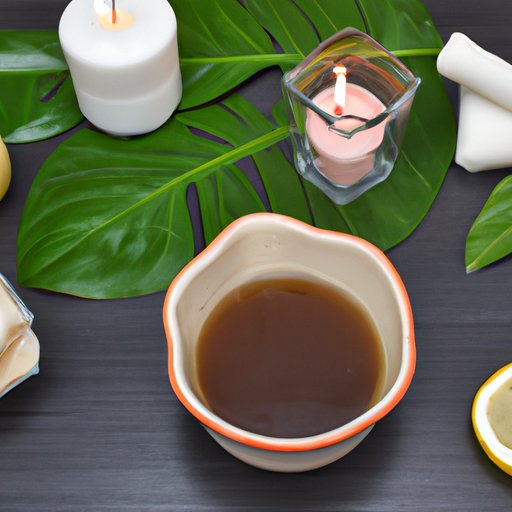The Ultimate Guide to Preventing and Treating Muscle Cramps
Muscle cramps can be a painful inconvenience that can strike at any time, especially during physical activities such as exercise. The sudden involuntary muscle contractions can be caused by a variety of factors, such as dehydration, muscle fatigue, or nutrient deficiencies. The good news is that muscle cramps can be stopped and prevented with natural remedies, quick fixes, and home remedies. Here is everything you need to know about preventing and treating muscle cramps fast.
Section 1: Understanding Muscle Cramps
Muscle cramps happen when muscles involuntarily contract and cannot relax, leading to painful spasms that can last from a few seconds to several minutes. They can occur in any muscle, but are most common in the legs and feet. Muscle cramps can be caused by various factors, such as:
- Dehydration
- Poor blood circulation
- Electrolyte imbalances
- Muscle fatigue
- Nutrient deficiencies
- Medications
- Medical conditions such as nerve damage, thyroid problems, or kidney failure
The symptoms of muscle cramps include sudden and sharp pain, muscle tightness, stiffness, and soreness. In some cases, the affected muscle can visibly contract and twitch.
Section 2: Natural Remedies for Stopping Muscle Cramps
Natural remedies can help prevent and treat muscle cramps. Here are some of the most effective ones:
Hydration and Electrolyte Balance
One of the main causes of muscle cramps is dehydration and electrolyte imbalances. To prevent this, make sure to drink enough water and replenish your electrolytes with fluids that contain potassium, magnesium, and sodium. Examples include coconut water, sports drinks, and natural fruit juices.
Stretching and Exercise
Stretching before and after exercise can help prevent muscle cramps by improving flexibility and blood flow to the muscles. Incorporating regular strength training exercises can also build endurance and resistance to fatigue, reducing the risk of cramping.
Hot and Cold Therapy
Hot and cold therapy can help relax stiff muscles and improve blood circulation. Applying heat to the affected muscle with a hot water bottle or warm towel can increase blood flow and reduce pain. Applying a cold compress can help numb the muscle and reduce swelling.
Magnesium and Other Supplements
Magnesium deficiency can cause muscle cramps. Therefore, supplementing with magnesium can help prevent and treat muscle cramps. Other supplements that can help with cramps include calcium, vitamin D, and vitamin E.
Herbal Remedies
Herbs such as ginger, turmeric, and peppermint contain anti-inflammatory properties that can help reduce cramps. Drinking herbal tea or incorporating these herbs into your diet can help prevent muscle cramps.
Section 3: Quick Fixes for Muscle Cramps
If you experience a muscle cramp, there are several quick fixes you can try to stop it:
Massaging Affected Muscle
Gently massaging the affected muscle can help reduce tension and promote relaxation. Use your hands to apply pressure to the cramping muscle and massage in circular motions.
Applying Pressure Points
Applying pressure to specific points on the body can help relieve muscle tension and promote relaxation. Gentle pressure applied to the acupressure points on the hands and feet, commonly used in reflexology, can help stop muscle spasms.
Breathing Exercises
Slow and deep breathing exercises can help calm the body and ease muscle tension. Breathe in for a count of five and out for a count of five, repeating until the cramp subsides.
Distraction Techniques
Focusing on something else can help take your mind off the pain of muscle cramps and promote relaxation. Listening to soothing music or practicing mindfulness can be effective distraction techniques.
Section 4: Home Remedies for Stopping Muscle Cramps Fast
If you are prone to muscle cramps, here are some home remedies you can try to prevent and treat them:
Making a Homemade Electrolyte Drink
You can make your own electrolyte drink at home by mixing water, lemon juice, honey, and a pinch of salt. This drink can help replenish electrolytes and prevent muscle cramps.
Using Essential Oils
Essential oils such as lavender or peppermint can help reduce muscle tension and promote relaxation. You can add a few drops of essential oil to a warm bath or apply it topically to the affected area.
Creating a Heat Pack
You can create a heat pack by filling a sock with rice and microwaving it for a few seconds. Apply the heat pack to the affected muscle to promote relaxation and reduce pain.
Section 5: Emergency Treatment for Muscle Cramps
If you experience severe or persistent muscle cramps, you may need emergency treatment. Here are some situations where you should seek medical attention:
- If the muscle cramps are severe and do not subside after trying home remedies
- If muscle cramps occur frequently and interfere with daily life
- If muscle cramps are accompanied by swelling, redness, and warmth in the affected area
- If muscle cramps are caused by a medical condition or medication
In an emergency situation, medical treatment may include intravenous fluids, muscle relaxants, and pain medication.
Conclusion
To stop muscle cramps fast, there are many natural remedies, quick fixes, and home remedies you can use. Maintaining proper hydration, electrolyte balance, and exercising regularly can help prevent muscle cramps from happening. If muscle cramps do occur, try massaging the affected muscle, applying pressure to pressure points, practicing breathing exercises, or using distraction techniques. For more severe muscle cramps, seek medical attention. By following these tips, you can prevent and treat muscle cramps quickly and effectively.
